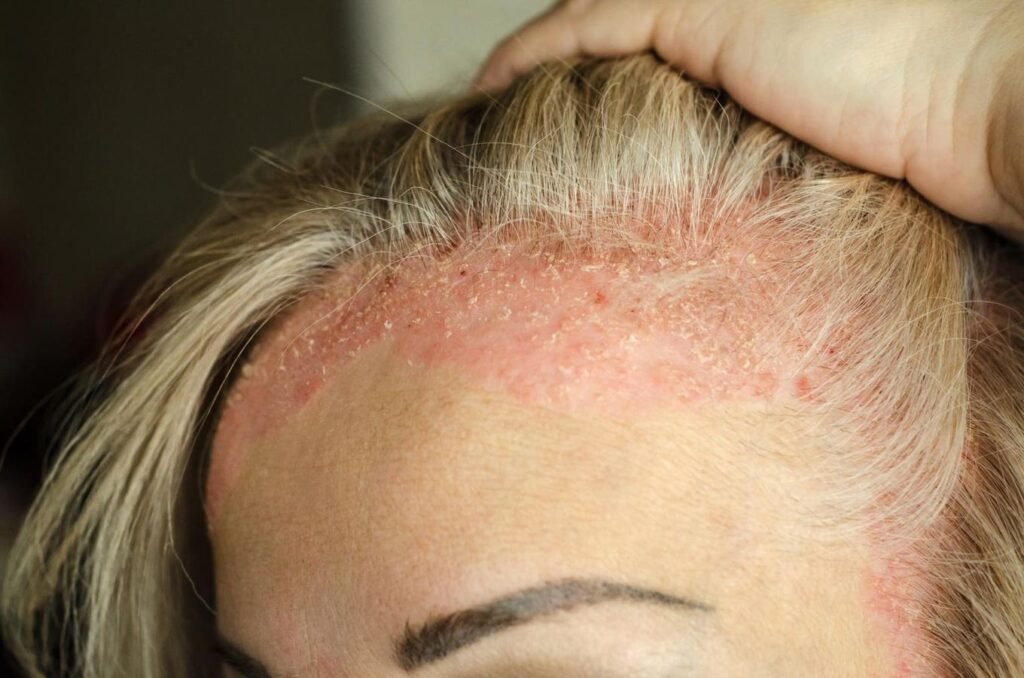Skin lesions on a persons forehead and scalp.
getty
The connection between gut and skin health is a popular topic, especially on social media, where probiotics, detox juices, and gut cleansing diets are promoted for clearer skin. But what does science actually say about the impact of diet on skin function and appearance?
Board-certified gastroenterologists, Dr. Pia Prakash and Dr. Austin Chiang, share insights on the evidence-based relationship between our gut and skin.
How Gut Microbiome and Tissue Health Affects Skin
The gastrointestinal tract extends from the mouth to the anus, with discussions often focusing on the stomach and intestines, the balance of bacteria there, and the integrity of the lining tissues.
The gut microbiome, consisting of bacteria, viruses, and fungi, plays a crucial role in maintaining overall health. In a healthy gut, beneficial organisms outnumber harmful ones, supporting digestion, immunity, and defense against pathogens.
Pia Prakash in the procedural suite
Pia Prakash
Disruption of this natural microbial balance, known as gut dysbiosis, can impact the immune system when beneficial bacteria decrease and pro-inflammatory bacteria increase. Prakash mentions the gut–skin axis, highlighting the bidirectional relationship between gut health and skin health. She explains, “Disruptions in the gut microbiome can contribute to inflammatory skin conditions like eczema, rosacea, acne, and psoriasis.”
Gut dysbiosis can also compromise the intestinal barrier, leading to increased permeability. This allows bacteria and byproducts to enter the bloodstream, triggering systemic inflammation that manifests as skin issues. Factors contributing to dysbiosis include antibiotic use, poor diet, stress, infections, and chronic diseases.
How Fiber and Probiotics Impact Gut Health
Fiber, a crucial component of a healthy diet recommended by gastroenterologists, influences gut microbiome composition and activity, enhancing diversity and supporting bacteria that produce beneficial short-chain fatty acids. These fatty acids serve as fuel for gut cells, possess anti-inflammatory properties, and aid in metabolizing foods. To increase fiber intake, Prakash suggests consuming plenty of fruits, vegetables, legumes, and whole grains.
Probiotics, which introduce “good” bacteria into the gut, have shown some effectiveness in managing conditions like eczema and psoriasis. Pairing probiotics with prebiotic-rich foods can further support microbial balance, as prebiotics are fibers that nourish beneficial gut microbes.
Limitations of Probiotics on Gut and Skin Health
Dr. Austin Chiang in a procedural suite
Dr. Austin Chiang
Chiang, the author of Gut: An Owner’s Guide, emphasizes that while probiotics and prebiotics show promise, further research is needed. These supplements may help by modulating the immune system, adjusting microbial balance, and supporting skin barrier function. However, their efficacy varies by condition and bacterial strain.
“Some studies have demonstrated improvement in psoriasis and atopic dermatitis with probiotics,” Chiang explains, but results are not consistent across the board. For example, a pediatric study showed improvement in eczema over 6 months with probiotics, while a study of adults with psoriasis found a probiotic blend reduced disease severity and relapse risk compared to placebo.
Further research is necessary before widespread recommendations can be made for skin health.
Gut-Healing Cleanses, Supplements, and Detoxes Should be Used with Caution
Gut-healing cleanses and restrictive diets are often marketed for skin care, but Chiang advises caution, noting that they lack evidence and can be unsafe.
Photograph of vegetables
Newsday via Getty Images
While targeted dietary changes can benefit conditions like dermatitis herpetiformis from celiac disease, Chiang recommends a balanced approach: a diet rich in fiber, minimal processed foods, and reduced red meat consumption. He emphasizes that “getting fiber from whole foods is preferable to supplements.”
Chiang advocates for personalized approaches, urging skepticism towards one-size-fits-all solutions. His concerns about safety are valid, as evidenced by cases of adverse reactions to unregulated products purchased online.
For instance, a patient experienced severe rectal bleeding after consuming an online detox juice. Many individuals order supplements or cleanses online without verifying the ingredients, posing potential risks to their health.
Myths about Gut Health and Skin Health
Chiang addresses two persistent myths surrounding gut and skin health. “There is a common belief that a colon cleanse can improve skin health,” Chiang explains, debunking the notion that cleansing the colon leads to healthier skin. The colon naturally eliminates waste through stool, so there is no accumulation of waste in the colon.
“Another myth I encounter is the idea that adopting a gluten-free diet can enhance skin clarity,” Chiang notes. “Unless someone has celiac disease, there is no evidence to support the claim that eliminating gluten will benefit the skin.”
How Long Until a Healthier Gut Impacts Skin?
For individuals with an underlying gut condition contributing to skin symptoms, improvement hinges on managing the primary disease. In the absence of a specific gastrointestinal disorder, changes to gut health through diet, prebiotics, or probiotics may yield modest skin benefits. Clinical trials have shown some improvement within 8–12 weeks for conditions like psoriasis and atopic dermatitis, but outcomes vary based on the condition, intervention, and individual factors.
The Bottom Line
The relationship between gut health and skin health is complex and evolving. Simple steps like increasing fiber intake, choosing whole foods, and exercising caution with supplements and trendy protocols are effective strategies.
“The gut microbiome wields significant influence,” Prakash emphasizes. “We are just scratching the surface of its impact, not only on skin but on various inflammatory conditions.”
For now, evidence-based practices, rather than cleanses or trends, offer the clearest path to nurturing gut health and reaping the benefits for skin health.


